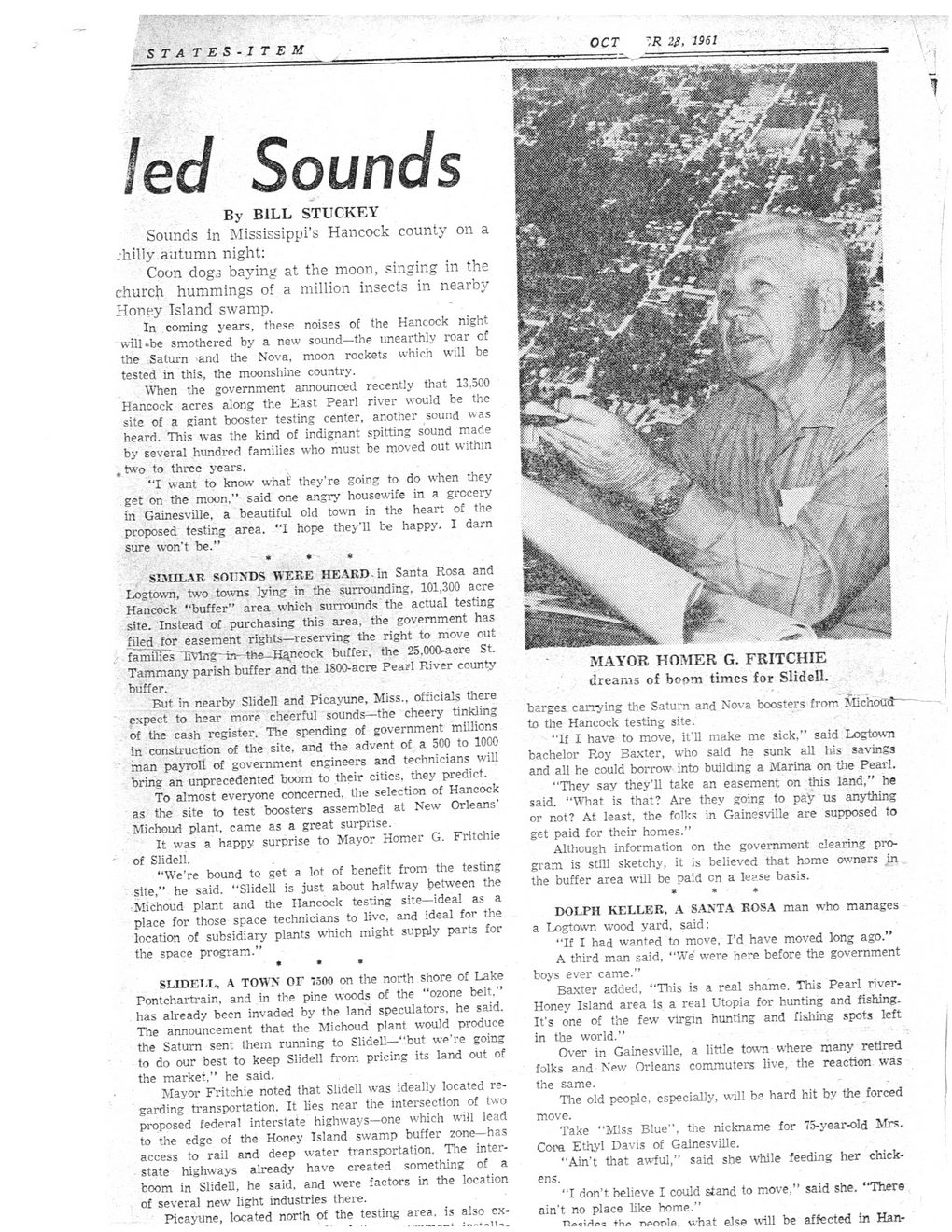This text was obtained via automated optical character recognition.
It has not been edited and may therefore contain several errors.
STATES-ITEM By BILL STUCKEY Sounds in Mississippi’s Hancock county on a jhilly autumn night: Coon dog,a baying at the moon, singing in the church hummings of a million insects in nearby Honey Island swamp. In coming years, these noises of the Hancock night will.be smothered by a new sound—the unearthly roar of the Saturn and the Nova, moon rockets which will be tested in this, the moonshine country. When the government announced recently that 13.500 Hancock acres along the East Pearl river would be the site of a giant booster testing center, another sound was heard. This was the kind of indignant spitting sound made by several hundred families who must be moved out within . two to three years. “I want to know what' they’re going to do when they get on the moon,” said one angry housewife in a grocery in Gainesville, a beautiful old town in the heart of the proposed testing area. “I hope they’ll be happy. I darn sure won’t be.” * * * SIMILAR SOUNDS WERE HEARD in Santa Rosa and Logtown, two towns lying in the surrounding, 101,300 acre Hancock “buffer” area which surrounds the actual testing site. Instead of purchasing this area, the government has filed for easement rights—reserving the right to move out famiiies~TiVlng~in-the_Hancock buffer, the 25,000-acre St. Tammany parish buffer and the 1800-acre Pearl River county buffer. But in nearby Slidell and Picayune, Miss., officials there expect to hear more cheerful sounds—the cheery tinkling of the cash register. The spending of government millions in construction of the site, and the advent of a 500 to 1000 man payroll of government engineers and technicians will bring an unprecedented boom to their cities, they predict. To almost everyone concerned, the selection of Hancock as the site to test boosters assembled at New Orleans’ Michoud plant, came as a great surprise. It was a happy surprise to Mayor Homer G. Fritchie of Slidell. “We’re bound to get a lot of benefit from the testing site,” he said. “Slidell is just about halfway between the Michoud plant and the Hancock testing site—ideal as a place for those space technicians to live, and ideal for the location of subsidiary plants which might supply parts for the space program.” * * * SLIDELL, A TOWN OF 7500 on the north shore of Lake Pontchartrain, and in the pine woods of the “ozone belt,” has already been invaded by the land speculators, he said. The announcement that the Michoud plant would produce the Saturn sent them running to Slidell—“but we're going to do our best to keep Slidell from pricing its land out of the market,” he said. Mayor Fritchie noted that Slidell was ideally located regarding transportation. It lies near the intersection of two proposed federal interstate highways—one which will lead to the edge of the Honey Island swamp buffer zone—has access to rail and deep water transportation. The interstate highways already have created something of a boom in Slidell, he said, and were factors in the location of several new light industries there. Picayune, located north of the testing area, is also ex- OCT 1R 28, 1961 MAYOR HOMER G. FRITCHIE dreams of boom times for Slidell. barges carrying the Saturn and Nova boosters from Michoud-----------------—■ to the Hancock testing site. “If I have to move, it'll make me sick,” said Logtown bachelor Roy Baxter, who said he sunk ail his savings and all he could borrow into building a Marina on the Pearl. “They say they’ll take an easement on this land,” he said. “What is that? Are they going to pay us anything or not? At least, the folks in Gainesville are supposed to get paid for their homes.” Although information on the government clearing program is still sketchy, it is believed that home owners in the buffer area will be paid cn a lease basis. * * * DOLPH KELLER, A SANTA ROSA man who manages a Logtown wood yard, said: “If I had wanted to move, I’d have moved long ago.” A third man said, “We were here before the government boys ever came.” Baxter added, “This is a real shame. This Pearl river-Honey Island area is a real Utopia for hunting and fishing. It’s one of the few virgin hunting and fishing spots left , in the world.” Over in Gainesville, a little town where many retired folks and New Orleans commuters live, the reaction was the same. The old people, especially, will be hard hit by the forced move. Take “Miss Blue”, the nickname for 75-year-old Mrs. | Cora Ethyl Davis of Gainesville. “Ain’t that awful,” said she while feeding her chickens. “I don’t believe I could stand to move,” said she. “There ain’t no place like home.” the nponlp. what else will be affected in Han-

Gainesville States-Item-1962-1